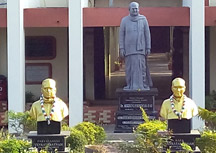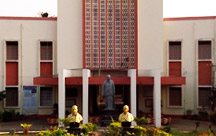Commerce
Showing 1–12 of 108 results
- ACB is accredited by the National Assessment and Accreditation Council (NAAC).
- NIIT, Faridabad
- National Service Scheme (NSS): It is a social service program that works for the betterment of society through community service. The students of NSS help the underprivileged people of society so that they can have a better life.
- National Cadet Corps (NCC): NCC works to serve the nation and spread the spirit of patriotism amongst the young people. It also encourages the young minds to join the armed forces and work selflessly for the nation ensuring that serving the nation will be their first priority.
 The Akkineni Nageswara Rao college is the result of the munificence and zeal for higher education of the people of Gudivada taluk and of the neighbouring taluks in Krishna district, Andhra Pradesh, situated in a rich agricultural area midway between Vijayawada and Machilipatnam, well connected by road, rail and canal with the leading towns and villages in the district. Gudivada has always been a center of great cultural and political activity and its citizens have played a prominent part in the life of the nation generally and in particular of Andhra Pradesh.In the education sphere too, need for a seat of higher learning was felt, and to meet this need a strong committee of local leaders was formed early in 1950, and an appeal for funds was made in the name of the following as members:
The Akkineni Nageswara Rao college is the result of the munificence and zeal for higher education of the people of Gudivada taluk and of the neighbouring taluks in Krishna district, Andhra Pradesh, situated in a rich agricultural area midway between Vijayawada and Machilipatnam, well connected by road, rail and canal with the leading towns and villages in the district. Gudivada has always been a center of great cultural and political activity and its citizens have played a prominent part in the life of the nation generally and in particular of Andhra Pradesh.In the education sphere too, need for a seat of higher learning was felt, and to meet this need a strong committee of local leaders was formed early in 1950, and an appeal for funds was made in the name of the following as members:- Sri. Pravataneni Venkataratnam, (President)
- Sri. Kaza Venkataramaiah, (Secretary)
- Sri. Vemulapalli Ramabrahmam, (Joint Secretary)
- Sri. Uppalapati Veerabhadra Rao, (Treasurer)
- Sri. Vadde Sobhanadri, (Member)
- Sri. Lingam Venkata Krishnaiah, (Member)
- Sri. Upadrasta Papanna Sastri, (Member)
 Busts of Late Parvathaneni Venkata Ratnam, Founder President And Late Kaza Venkataramaiah, Founder Secretary of the College
Busts of Late Parvathaneni Venkata Ratnam, Founder President And Late Kaza Venkataramaiah, Founder Secretary of the College Sri Yerneni Venkateswara Rao, a philanthropist of Mudinepalli donated a sum of Rs.60,000 to construct a spacious auditorium in memory of his father Yerneni Chalamaiah.The college shifted to its present location in July 1959. Sri A.F.Thyagaraju, our founder Principal, after having laid firm foundation for academic excellence, left the college on July 16, 1966 and Dr. Y.Venkateswara Rao, M.Sc., Ph.D., took over as Principal.He took up the challenging task of construction of R.C.C. buildings with the active involvement and cooperation of three popular local doctors, A.V. Raghavaiah, T.L. Perumallu and P.L.Narasimha Rao, and handsome donations from the public and matching grants from the University Grants Commission. It is perhaps not out of place to say that even the academic and administration foundation of the college were laid under the leadership of Dr. Y.Venkateswara Rao who as Principal, had rendered yeoman service for the all round development of this college. The successive Principals followed the footsteps of the first two Principals of the college in maintaining the same standards of excellence.
Sri Yerneni Venkateswara Rao, a philanthropist of Mudinepalli donated a sum of Rs.60,000 to construct a spacious auditorium in memory of his father Yerneni Chalamaiah.The college shifted to its present location in July 1959. Sri A.F.Thyagaraju, our founder Principal, after having laid firm foundation for academic excellence, left the college on July 16, 1966 and Dr. Y.Venkateswara Rao, M.Sc., Ph.D., took over as Principal.He took up the challenging task of construction of R.C.C. buildings with the active involvement and cooperation of three popular local doctors, A.V. Raghavaiah, T.L. Perumallu and P.L.Narasimha Rao, and handsome donations from the public and matching grants from the University Grants Commission. It is perhaps not out of place to say that even the academic and administration foundation of the college were laid under the leadership of Dr. Y.Venkateswara Rao who as Principal, had rendered yeoman service for the all round development of this college. The successive Principals followed the footsteps of the first two Principals of the college in maintaining the same standards of excellence.AMBALIKA INSTITUTE OF MANAGEMENT AND TECHNOLOGY
Amity University Jaipur was established in 2008 by Amity University Rajasthan Act 2008. Amity University Jaipur is spread over 150 acres of land. Amity University Jaipur offers courses at undergraduate, postgraduate and doctoral levels. Amity University Jaipur has over 225 faculties.
Amity University Jaipur has six centres of excellence namely Amity Centre for Positivism and Happiness, Amity Centre for Converging Technology and Sciences (ACCTS), Amity Centre for Mycobacterial Disease Research (ACMDR), Yunus Social Business Centers (YSBC), Amity Centre for Ocean Atmospheric Science and Technology (Amity COAST), and Amity Interdisciplinary Centre for Climate and Research & Policy (AICCRP).
Amity University Jaipur vision is to provide value-based contemporary education with a focus on innovation, research and productivity with a mixture of modern and contemporary teaching styles. Amity University Jaipur is a member of the Association of Indian Universities, Association of Commonwealth Universities, UK, The Institute of Engineering and Technology, Accreditation by ASIC- Accreditation Service for International Colleges, UK. Amity University Jaipur aim is to achieve academic leadership in research activities and develop partnerships with various institutions to advance research in various fields.
Amity University Jaipur has signed MoUs with international institutions such as York University, Florida and Centre for Ocean-Atmospheric Prediction Studies, Florida State University etc
Amity University Jaipur provides students’ labs for languages, media studies, education, pharmacy, biotechnology, engineering, hotel management, business management and scientific research to facilitate a practical learning experience. The university offers accommodation facilities to the students, the hostels are a comfortable and safe place to stay.
Amity University Lucknow campus (AULC) was established in 2004. It is a constituent unit of Amity University Noida. Amity University has multiple campuses across 11 Indian cities, including Lucknow, Greater Noida, Noida, Mumbai, Jaipur, Gurgaon, Gwalior, Raipur, Kolkata, Ranchi, and Patna. Amity University Lucknow is recognised by the University of Grants Commission (UGC) and the All India Council for Technical Education (AICTE). Amity University Lucknow is a 40-acre state of the art campus offering various academic and infrastructure facilities. The Amity University Lucknow campus offers UGC recognised undergraduate and postgraduate courses in a variety of disciplines.
Amity University Lucknow offers undergraduate, postgraduate and doctorate programmes across various disciplines such as Engineering, Commerce, Sciences, Law, Arts Humanities and Social Sciences, Medicine and Allied Science, Pharmacy, Management and Business Administration and many more.
The UG and PG courses at Amity University Lucknow are B.Sc (Hons.), B.Arch, B.Tech, B.Com (Hons.), B.A (Hons.), B.A L.L.B (Hons.), B.B.A L.L.B (Hons.), M.A, M.Sc, M.Tech, M.Com, M.B.A, L.L.M and many more courses.
Amity University Lucknow offers various infrastructural facilities to the students and faculty members of the campus that include sports facilities for both outdoor and indoor games, ICT enabled classrooms and lecture theatres, well-equipped gym with air-conditioners and gym equipment, separates hostels for girls and boys provided with necessary facilities, library having a huge collection of books and study materials, cafeteria serving good quality food at an affordable price, auditorium, moot court halls for discussions and moot court activities etc.
Amity University, Lucknow Location
Amity University, Lucknow is located in Malhaur Railway Station Road, Gomti Nagar, Lucknow, Uttar Pradesh. The nearest airport from the university is the Chaudhary Charan Singh International Airport which is located 27 km away and students can reach the campus in approximately 39 minutes. The nearest railway station from the university is the Lucknow Junction Railway Station which is located 16.5 km away and students can reach the university campus in about 30 minutes.
Amity University
Amity University, Mohali was founded with the objective of providing excellent education in undergraduate and postgraduate programs. The university has received accreditation from NAAC with an A+ grade. Additionally, Amity University Mohali has also been accredited by IACBE, ACBSP, Bar Council of India, Council of Architecture, NCTE, and ASIC. It is recognized by the University Grants Commission, Department of Science and Technology, and Central Counselling Board. In addition to these accreditations and recognitions, Amity University Mohali is a proud member of the Association of Indian Universities, Association of Commonwealth Universities, and International Association of Universities.
Amity University Mohali provides a wide range of courses at both the Undergraduate and Postgraduate levels in various fields. The admission process for UG and PG courses at Amity University Mohali is determined by the chosen course, as it is based on merit and personal interviews. To apply for admission to Undergraduate and Postgraduate courses, candidates must submit their applications through the official website of the university.
Andhra Christian College was founded with the ideal of providing for the youth of the country in general and of Guntur and other districts of Andhra Pradesh in particular the high type of Christian education. It holds to the Truism that secular training is insufficient and so to it seeks implant in its students, those truths which can raise men to a purer and nobler life and which are efficacious in the building up of character. Its sponsors trust that the men and women trained here will be filled with that spirit of service and inspired by those ideals of life which will lend them to dedicate their lives and talents to the best interest of their fellows and their country.
Andhra Christian College is a co-educational institution. Since 1926 the educational opportunities at Andhra Christian College have been opened to young women on equal terms with young men. The college endeavors to give its women students real college life and encourage their participation in all of its activities as the best means of preparing them for meeting the challenges of life which await them.
Andhra Christian college desires to cultivate in all its students men and women a knowledge and appreciation of the social amenities which make for harmonious human relationships and to create a proper regard for sound social values.
Andhra Christian College seeks to assist its students to develop the power of clear thinking based upon sound and broad knowledge, to develop an attitude of open mindedness to emphasize the practice of testing all information and conclusions and to develop creative scholarship.
Andhra Christian College desires to train and assist its students to uphold the great ideals of the human race, and to respect the dignity of man and the sacredness of human personality.
Andhra Christian College believes that the years of intellectual discipline should create in its students a sense of civic responsibility and encourage them to accept that responsibility as the natural compliment of the privileges they have enjoyed.
HISTORY AND DESCRIPTION
Andhra Christian College had its beginnings in the first Anglo – Vernacular school, which was already established in district collector’s compound and handed over in 1842 to Fr. Heyer who came to Guntur and established the American Evangelical Lutheran Mission in the same year. This school was supported by subscriptions from English friends of Missionary education then living in Guntur. Owing to financial and other difficulties due to civil war in America, the school was closed in 1863. And it was reopened in the year 1873, when it was re – organized by Dr. L.L. Uhl. From this time the school increased in number, service and influence. In September 1885, with Dr. L.B. Wolf as the Principal, the school was affiliated to the Madras University as a Second Grade College, known as the American Evangelical Lutheran Mission (A.E.L.M.) College. Through the efforts of Dr. Uhl and by the generous gifts of Mr. Arthur Watt and other friends in the United States, funds were secured with which the Watt’s Memorial Building was built. This building was first occupied in 1893.In 1907 Dr. Wolf retired from service in India and Dr. Uhl again assumed charge continuing as Principal until 1913 when he was succeeded by Dr. J. Roy Strock. In 1915 Dr. Uhl was appointed as Principal emeritus and in 1916 on Dr. Strock’s going on furlough, Rev. G.A. Ripely became the Principal and continued until Dr. Strock’s return to the College in 1919.In April 1922, Dr. Strock, at the invitation of the Church Missionary Society, assumed the Principalship of Noble College. Masulipatnam, and Dr. Victor Me. Cauley acted as Principal for the College until January 1923, when Dr. H.H. Sipes took charge Dr. Sipes served until January 1927 when Dr. Strock returned to the College.In 1925 in response to the invitation of Andhra Christian Council representing all the Christian Missions working in the Telugu area the U.L.C. Mission undertook the development of United Christian College for Andhra Pradesh. The Mission authorities under the leadership of Rev. J.Roy Strock, D.D. inaugurated a campaign in America for the raising of three hundred thousand dollars for the development of the College. The campaign was successful and practically the full amount required was secured. In March 1926 the College was affiliated to the Madras University as First Grade College offering courses in Mathematics, Philosophy and History for the B.A. Degree.
The Andhra University Act came into force in April 1926 and the first B.A. Class was admitted to the College in the following July. This development inaugurated a new era in the life of the institution which in the years following rapidly won outstanding place among the colleges of the university.
In January 1928 by an action of the Mission Council the name of the institution was changed from the A.E.L.M. College to Andhra Christian College.
Upon Dr. Strock’s going on furlough in January 1937, Dr. Sipes was appointed as the Principal. B.Sc. Courses in Mathematics and Physics were introduced in 1934 and negotiations were opened with Madras Government for the Old District Munsiffs Court site of 7 acres to provide additional land for College purpose.
In 1937 the District Muniffs Court site was purchased. In December 1938 upon the resignation of Dr. Strock, Mr. V Ch. John, M.A. LT. was appointed as Principal of the College. He assumed charge on January, 1,1939 and continued to serve until his retirement in June 1941 when he was succeeded by Dr. Sipes.
During the years 1938-41 the college carried out an extensive building programme under the supervision of the Rev. John Flnefrock, D.D. of the Mission Building Department. Heyer and Wolf Halls were erected at a cost of Rs. 40,000 to provide modern hostel accommodations for 300 students with the Luther League ndministration. Building providing additional class-rooms, offices nnd general room, a new Assembly Hall to seat 1,200 people were built and occupied from July, 1948. In January 1944, Dr. Sipes proceeded on furlough and Rev. C.H. Swavely served as Principal iinlil the return of Dr. Sipes in November 1945. Dr Sipes continued Principal till September 1948.
Rev. C.H. Swavely was acting Principal from September 1948 to April 1950.
Dr. T.S. Paulus was appointed as Principal and assumed charge from May 1, 1950 and sewed till his retirement in July 1962. Rev. C.H. Swavely became Bursar from May 1950 and left on furlough in November, 1955. Miss. Lilith Schawab assumed charge as Bursar of the College from November 1952 to June 1954. Rev. C.H. Swavely assumed charge as Bursar of the College on his return from furlough in July, 1954, until his retirement in April 1960.
During these years the college progressed in physical size and accommodation under the initiative of Dr. T.S. Paulus Principal and Mr. C.N. Devadanam, Bursar. The Strock Hall, the Recreation Hall, N.C.C. Building and the new Chemistry Laboratory, have been added to the College plant in recent years. This additional accommodation has ushered in a new progressive era in the life of the College.














